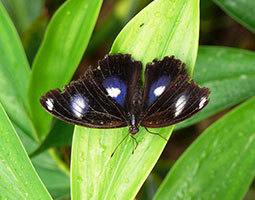Hypolimnas bolina
Description

The Common Eggfly (also called the great eggfly, varied eggfly) is a large butterfly (i.e. 8cm wingspan) with a high degree of sexual dimorphism (visual physical differences between male and female). Butterflies belong to the order Lepidoptera.
Males butterflies have a large white spot in the middle of each wing, which is surrounded by a iridescent purple. Females are also mainly black in colour but have white and orange patterns on the top side of their wings.
The caterpillars are black with orange-yellow branch-spines and feed mostly at night.
The Common Eggfly is usually found in lightly wooded country, as well as the greener parts of human habitats. Males are a common sight in summer along the footpath or forest edge, as they wait for females to pass. Males are territorial and chase other butterflies away.
Adaptations
- Known to mimic the Euploea butterfly genus which are poisonous to eat, so that predators avoid them
- Females are known for maternal care, rare in butterflies, hovering over a plant to check for ants which will eat her eggs and guarding leaves where eggs have been laid
Feeding relationships
- What I eat: caterpillar food plan is Pastel Flower (Pseuderanthemum variable), Lesser Joyweed (Alternanthera denticulata), Persicaria etc. which are usually found in moist shaded areas of eucalypt forests
- What eats me: eggs - ants, parasitic wasps; larvae and adults - spiders, birds, frogs, lizards and rats
Interesting facts
The Common Eggfly consumes human sweat for its salt content, which is lacking in nectar flowers, important for butterflies' metabolism and it fuels reproductive prowess in males.
Acknowledgements: Brisbane Insects, Coffs Harbour Butterfly House, Wikipedia, Natural History Museum